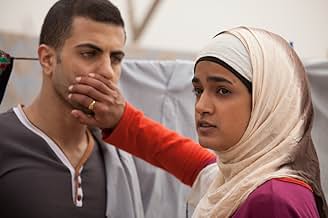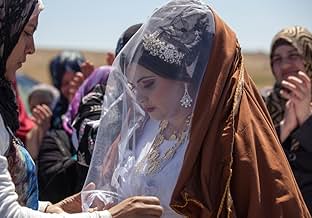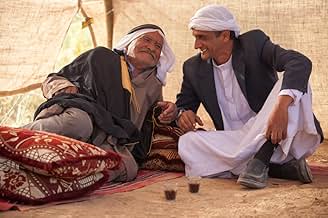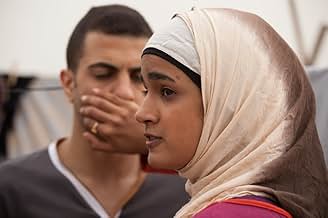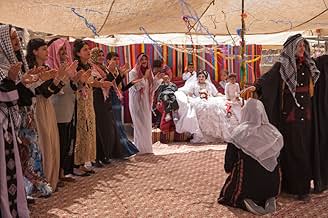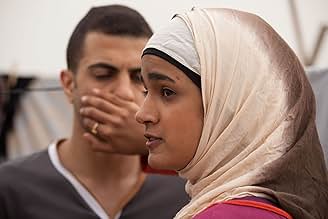When their entire lives shatter, two Bedouin women struggle to change the unchangeable rules, each in her own individual way.When their entire lives shatter, two Bedouin women struggle to change the unchangeable rules, each in her own individual way.When their entire lives shatter, two Bedouin women struggle to change the unchangeable rules, each in her own individual way.
- Awards
- 15 wins & 19 nominations total
Hitham Omari
- Suliman
- (as Haitham Omari)
Khadija Al Akel
- Tasnim
- (as Khadija Alakel)
- Director
- Writer
- All cast & crew
- Production, box office & more at IMDbPro
6.84K
1
2
3
4
5
6
7
8
9
10
Featured reviews
A tour de force of filmmaking, writing, acting.
Ever so subtly like a friend pulling your arm gently, this film pulls your into the world of women and how suffocating it is for them. Across nearly four generations. With the fourth one standing at the window of womanhood but not there yet. It will tell you how their voices are muted, how their choices are compromised, how emotions, feelings, their conscience, society, reputation are all used against them. The mother is the best actor I've seen in a Long time on screen. The amount of pain, frustration, anguish she conveys with so much subtlety is mind numbing. The Daughter was stellar too. Sumbolism and metaphor used time and again in the form of tunnels, windows, make up, weddings as a societal device. Gorgeous film. One of the best I've seen offlate. Kudos to the filmmaker, the crew and the actors. Phenomenal.
Normative is different in different cultures
Sufat Chol (2016) is an Israeli movie that was shown in the U.S. with the title Sand Storm. It was written and directed by Elite Zexer.
The film takes place in an area of Israel where the Bedouins live. (Truth in reviewing--I didn't know there were Bedouins in Israel. However, they make up 3.5% of the population.) The film is in Arabic, and no Jewish Israelis appear in it. There is one mention of houses being bulldozed, but that's the only sense that there's a majority population outside the village.
Lamis Ammar plays Layla, a intelligent young woman, who is in love with "someone from a different tribe." That's not OK.
Ruba Blal portrays Jalila, Layla's mother. Hitham Omari is Suliman, Layla's father and Jalila's husband.
Matters are a little confusing in the beginning, as a pickup truck arrives at a home. The load in the pickup truck is a new bed. It signals to us that Suliman has taken a second wife. The bed is their wedding bed.
We know that, for Muslims, having more than one wife is normative. However, as the plot develops, it's clear that other matters that are considered normative appear unacceptable by our standards.
In fact, the rules and restrictions of the village appeared medieval to me. I considered whether this was an Israeli propaganda film, showing to the world how primitive the Bedouins are. However, a close friend, who is knowledgeable about these matters, assured me that this is the reality of Bedouin life in Israel.
The restrictions the mother and daughter face are disturbing and grim. However, that's what makes up the plot of the film.
This movie worked well on the small screen. It has an anemic IMDb rating of 6.8. I wondered why this important movie had such a low rating. When I checked the demographics it became clearer. Men rated it 6.7, while females rated it 7.0. (As usual, male raters outnumbered female raters. In this case, it was two to one.)
I think even 7.0 is too low for this movie. I rated it 9.
The film takes place in an area of Israel where the Bedouins live. (Truth in reviewing--I didn't know there were Bedouins in Israel. However, they make up 3.5% of the population.) The film is in Arabic, and no Jewish Israelis appear in it. There is one mention of houses being bulldozed, but that's the only sense that there's a majority population outside the village.
Lamis Ammar plays Layla, a intelligent young woman, who is in love with "someone from a different tribe." That's not OK.
Ruba Blal portrays Jalila, Layla's mother. Hitham Omari is Suliman, Layla's father and Jalila's husband.
Matters are a little confusing in the beginning, as a pickup truck arrives at a home. The load in the pickup truck is a new bed. It signals to us that Suliman has taken a second wife. The bed is their wedding bed.
We know that, for Muslims, having more than one wife is normative. However, as the plot develops, it's clear that other matters that are considered normative appear unacceptable by our standards.
In fact, the rules and restrictions of the village appeared medieval to me. I considered whether this was an Israeli propaganda film, showing to the world how primitive the Bedouins are. However, a close friend, who is knowledgeable about these matters, assured me that this is the reality of Bedouin life in Israel.
The restrictions the mother and daughter face are disturbing and grim. However, that's what makes up the plot of the film.
This movie worked well on the small screen. It has an anemic IMDb rating of 6.8. I wondered why this important movie had such a low rating. When I checked the demographics it became clearer. Men rated it 6.7, while females rated it 7.0. (As usual, male raters outnumbered female raters. In this case, it was two to one.)
I think even 7.0 is too low for this movie. I rated it 9.
A sad film, that urges you to look beyond the film, and in to the future.
This film depicts a Bedouin family on the brink of changing traditions.
When the father of the family takes a second wife, and the daughter finds herself in love with a boy from college. Each character must make decisions that will change the outcome of the family. Although a main theme is about woman living in world of strict traditions I think it is mainly about a family trying to make the right decisions for each other.
Throughout the film the director will turn you against the adults, and then give you a window of insight that will allow you to sympathize with them. I was constantly urging the characters to do something, on the end of the seat, and although the film left me a little sad you must look beyond the film, to what it is trying to hint the future may hold, not just for the protagonists, but all woman around the world.
I will certainly be thinking about Layla, her sister and what life has in hold for them, for a while.
When the father of the family takes a second wife, and the daughter finds herself in love with a boy from college. Each character must make decisions that will change the outcome of the family. Although a main theme is about woman living in world of strict traditions I think it is mainly about a family trying to make the right decisions for each other.
Throughout the film the director will turn you against the adults, and then give you a window of insight that will allow you to sympathize with them. I was constantly urging the characters to do something, on the end of the seat, and although the film left me a little sad you must look beyond the film, to what it is trying to hint the future may hold, not just for the protagonists, but all woman around the world.
I will certainly be thinking about Layla, her sister and what life has in hold for them, for a while.
Captures well delicate complexity of the situation.
Perhaps I have to reevaluate my ingrained trust with 7 stars rating as a metric of quality, with this at 6.8 I didn't expect so high. I anticipated it to be a stereotypical, politically charged Arab's crude conservatism imagery that detach, delineate you to side clearly off the black and white character (as in social value metric not typical good and bad). Unexpectedly, it unpacks humanely with a blend of conflicting contradiction in the character far from being one dimensional, inhibited by consequence we have no clear insight about but hinted. Someone or thing is either way at stake. The father fosters a certain privilege to his daughter but hypocrite through indirect treatment to his first wife, yet you still pity him for whatever it is that inhibit him. Her mom, uptight and resentful turns out protecting her for an option her daughter deserves, more so than the more liberal father.
Halfway through I found it well put and anticipated a disappointing turn that justifies the below 7 rating. There was none. The ending is not as justly suited to what her strong personality suggested to be, by (spoiler) having her bent to tradition eventually (but well, this is real life). She remained guarded unmannerly at the end. The new husband's hint of submissive reaction draws him less of a typical antagonist. Made you think that fairness aside, it has yet been proven to be dramatically a whole lot of wrong turn, just like real life: some options might be not entirely bad but not wanting it in the first place compromised some degree of unsatisfactory or happiness.
Halfway through I found it well put and anticipated a disappointing turn that justifies the below 7 rating. There was none. The ending is not as justly suited to what her strong personality suggested to be, by (spoiler) having her bent to tradition eventually (but well, this is real life). She remained guarded unmannerly at the end. The new husband's hint of submissive reaction draws him less of a typical antagonist. Made you think that fairness aside, it has yet been proven to be dramatically a whole lot of wrong turn, just like real life: some options might be not entirely bad but not wanting it in the first place compromised some degree of unsatisfactory or happiness.
A must watch for film about female struggle in a man's world.
The film follows the struggle of a young Bedouin girl and her will to be free of old traditions that try to keep her caged in a man's world. The main plot follows Jalila (Ruba Blal-Asfour), the first wife of a man that is trapped under the pressure of having a new young wife join the clan. Her daughter, Layla (Lamis Ammar), has a secret lover at school, and Jalila must decide if she is part of the mechanism that will trap her daughter too or going to fight for the next generation to have more than she could ever dream of. The brave directing and storytelling brings to the screen a complex story, exhibiting female struggles from a very specific perspective yet in a very universal way. It is not by chance that the film has had such a successful festival circuit.
Did you know
- TriviaFirst full-length feature for the director Elite Zexer.
- How long is Sand Storm?Powered by Alexa
Details
- Release date
- Countries of origin
- Official site
- Language
- Also known as
- Kum Firtinasi
- Filming locations
- Production companies
- See more company credits at IMDbPro
Box office
- Budget
- ₪3,850,000 (estimated)
- Gross US & Canada
- $86,800
- Opening weekend US & Canada
- $6,849
- Oct 2, 2016
- Gross worldwide
- $414,698
- Runtime
- 1h 27m(87 min)
- Color
- Sound mix
- Aspect ratio
- 2.35 : 1
Contribute to this page
Suggest an edit or add missing content


